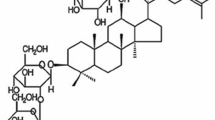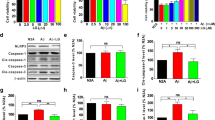Abstract
A high dose of dexamethasone induces neurodegeneration by initiating the inflammatory processes that lead to neural apoptosis. A dexamethasone administration model induces overproduction of amyloid-β (Aβ) and tau protein hyperphosphorylation and shows abnormalities of cholinergic function similar to Alzheimer’s disease (AD). This study aimed to investigate the protective effect of hexahydrocurcumin on the brain of dexamethasone-induced mice. The results showed that hexahydrocurcumin and donepezil attenuated the levels of amyloid precursor protein and β-secretase mRNA by reverse transcription polymerase chain reaction, decreased the expression of hyperphosphorylated tau, and improved synaptic function. Moreover, we found that hexahydrocurcumin treatment could decrease interleukin-6 levels by attenuating p65 of nuclear factor kappa-light-chain-enhancer (NF-κB) of activated beta cells. In addition, hexahydrocurcumin also decreased oxidative stress, as demonstrated by the expression of 4-hydroxynonenal and thereby prevented apoptosis. Therefore, our finding suggests that hexahydrocurcumin prevents dexamethasone-induced AD-like pathology and improves memory impairment.






Similar content being viewed by others
References
Abbasi M, Ilyas M, Sonia A, Shahwar D, Raza M, Khan K, Ashraf M, Afzal I, Ambreen N (2012) Curcumin and its derivatives: moderate inhibitors of acetylcholinesterase, butyrylcholinesterase and trypsin. SCI IRAN 19(6):1580–1583. https://doi.org/10.1016/j.scient.2012.10.014
Anand P, Kunnumakkara AB, Newman RA, Aggarwal BB (2007) Bioavailability of curcumin: problems and promises. Mol Pharm 4(6):807–818. https://doi.org/10.1021/mp700113r
Bourne KZ, Ferrari DC, Lange-Dohna C, Rossner S, Wood TG, Perez-Polo JR (2007) Differential regulation of BACE1 promoter activity by nuclear factor-κB in neurons and glia upon exposure to β-amyloid peptides. J Neurosci Res 85(6):1194–1204. https://doi.org/10.1002/jnr.21252
Briggs R, Kennelly SP, O’Neill D (2016) Drug treatments in Alzheimer’s disease. Clin Med (Lond) 16(3):247–253. https://doi.org/10.7861/clinmedicine.16-3-247
Buggia-Prevot V, Sevalle J, Rossner S, Checler F (2008) NFkappaB-dependent control of BACE1 promoter transactivation by Abeta42. J Biol Chem 283(15):10037–10047. https://doi.org/10.1074/jbc.M706579200
Bustanji Y, Taha MO, Almasri IM, Al-Ghussein MA, Mohammad MK, Alkhatib HS (2009) Inhibition of glycogen synthase kinase by curcumin: investigation by simulated molecular docking and subsequent in vitro/in vivo evaluation. J Enzyme Inhib Med Chem 24(3):771–778. https://doi.org/10.1080/14756360802364377
Changtam C, de Koning HP, Ibrahim H, Sajid MS, Gould MK, Suksamrarn A (2010) Curcuminoid analogs with potent activity against Trypanosoma and Leishmania species. Eur J Med Chem 45:941–956. https://doi.org/10.1016/j.ejmech.2009.11.035
Chen C-H, Zhou W, Liu S, Deng Y, Cai F, Tone M, Tone Y, Tong Y, Song W (2012) Increased NF-κB signalling up-regulates BACE1 expression and its therapeutic potential in Alzheimer’s disease. Int J Neuropsychopharmacol 15(1):77–90. https://doi.org/10.1017/S1461145711000149
Danilczuk Z, Sekita-Krzak J, Lupina T, Danilczuk M, Czerny K (2006) Influence of dizocilpine (MK-801) on neurotoxic effect of dexamethasone: behavioral and histological studies. Acta Neurobiol Exp (Wars) 66(3):215–226
Das TK, Jana P, Chakrabarti SK, Hamid A, Mas R (2019) Curcumin downregulates GSK3 and Cdk5 in scopolamine-induced Alzheimer’s disease rats abrogating Aβ 40/42 and tau hyperphosphorylation. J Alzheimers Dis Rep 3(1):257–267. https://doi.org/10.3233/ADR-190135
Ellman GL, Gourtney KD, Andres V Jr, Featherstone RM (1961) A new and rapid colorimetric determination of acethylcholinesterase activity. Biochem Phrmacol 7(2):88–95. https://doi.org/10.1016/0006-2952(61)90145-9
Green KN, Billings LM, Roozendaal B, McGaugh JL, LaFerla FM (2006) Glucocorticoids increase amyloid-β and tau pathology in a mouse model of Alzheimer’s disease. J Neurosci 26(35):9047–9056. https://doi.org/10.1523/JNEUROSCI.2797-06.2006
Hu S, Maiti P, Ma Q, Zuo X, Jones MR, Cole GM et al (2015) Clinical development of curcumin in neurodegenerative disease. Expert Rev Neurother 15(6):629–637. https://doi.org/10.1586/14737175.2015.1044981
Hu W, Zhang Y, Wu W, Yin Y, Huang D, Wang Y et al (2016) Chronic glucocorticoids exposure enhances neurodegeneration in the frontal cortex and hippocampus via NLRP-1 inflammasome activation in male mice. Brain Behav Immun 52:58–70. https://doi.org/10.1016/j.bbi.2015.09.019
Huang Y, Cao S, Zhang Q, Zhang H, Fan Y, Qiu F et al (2018) Biological and pharmacological effects of hexahydrocurcumin, a metabolite of curcumin. Arch Biochem Biophys 646:31–37. https://doi.org/10.1016/j.abb.2018.03.030
Jarrett JT, Berger EP, Lansbury PT Jr (1993) The carboxy terminus of the beta amyloid protein is critical for the seeding of amyloid formation: implications for the pathogenesis of Alzheimer’s disease. Biochemistry. 32(18):4693–4697. https://doi.org/10.1021/bi00069a001
Joshi YB, Chu J, Praticò D (2012) Stress hormone leads to memory deficits and altered tau phosphorylation in a model of Alzheimer’s disease. J Alzheimers Dis 31(1):167–176. https://doi.org/10.3233/JAD-2012-120328
Kang G, Kong P-J, Yuh Y-J, Lim S-Y, Yim S-V, Chun W, Kim S-S (2004) Curcumin suppresses lipopolysaccharide-induced cyclooxygenase-2 expression by inhibiting activator protein 1 and nuclear factor κB bindings in BV2 microglial cells. J Pharmacol Sci 94(3):325–328. https://doi.org/10.1254/jphs.94.325
Kar S, Slowikowski SP, Westaway D, Mount HT (2004) Interactions between β-amyloid and central cholinergic neurons: implications for Alzheimer’s disease. J Psychiatry Neurosci 29(6):427–441
Kumar A, Singh A, Ekavali (2015) A review on Alzheimer’s disease pathophysiology and its management: an update. Pharmacol Rep 67(2):195–203. https://doi.org/10.1016/j.pharep.2014.09.004
Ladner CJ, Lee JM (1998) Pharmacological drug treatment of Alzheimer disease: the cholinergic hypothesis revisited. J Neuropathol Exp Neurol 57(8):719–731. https://doi.org/10.1097/00005072-199808000-00001
LaFerla FM, Green KN, Oddo S (2007) Intracellular amyloid-β in Alzheimer’s disease. Nat Rev Neurosci 8(7):499. https://doi.org/10.1038/nrn2168
Lahiri DK (2004) Functional characterization of amyloid β precursor protein regulatory elements: rationale for the identification of genetic polymorphism. Ann N Y Acad Sci 1030(1):282–288. https://doi.org/10.1196/annals.1329.035
Lee S-L, Huang W-J, Lin WW, Lee S-S, Chen C-H (2005) Preparation and anti-inflammatory activities of diarylheptanoid and diarylheptylamine analogs. Bioorg Med Chem 13(22):6175–6181. https://doi.org/10.1016/j.bmc.2005.06.058
Li W, Suwanwela NC, Patumraj S (2016) Curcumin by down-regulating NF-kB and elevating Nrf2, reduces brain edema and neurological dysfunction after cerebral I/R. Microvasc Res 106:117–127. https://doi.org/10.1016/j.mvr.2015.12.008
Li Y, Liu L, Kang J, Sheng JG, Barger SW, Mrak RE et al (2000) Neuronal–glial interactions mediated by interleukin-1 enhance neuronal acetylcholinesterase activity and mRNA expression. J Neurosci 20(1):149–155. https://doi.org/10.1523/JNEUROSCI.20-01-00149.2000
McCubrey JA, Lertpiriyapong K, Steelman LS, Abrams SL, Cocco L, Ratti S, Martelli AM, Candido S, Libra M, Montalto G (2017) Regulation of GSK-3 activity by curcumin, berberine and resveratrol: potential effects on multiple diseases. Adv Biol Regul 65:77–88. https://doi.org/10.1016/j.jbior.2017.05.005
McEwen BS, Magarinos AM (2001) Stress and hippocampal plasticity: implications for the pathophysiology of affective disorders. Hum Psychopharmacol 16(S1):S7–S19. https://doi.org/10.1002/hup.266
Menon VP, Sudheer AR (2007) Antioxidant and anti-inflammatory properties of curcumin. Adv Exp Med Biol 595:105–125. https://doi.org/10.1007/978-0-387-46401-5_3
Morales NP, Sirijaroonwong S, Yamanont P, Phisalaphong C (2015) electron paramagnetic resonance study of the free radical scavenging capacity of curcumin and its demethoxy and hydrogenated derivatives. Biol Pharm Bull 38(10):1478–1483. https://doi.org/10.1248/bpb.b15-00209
Moussa-Pacha NM, Abdin SM, Omar HA, Alniss H, Al-Tel TH (2020) BACE1 inhibitors: current status and future directions in treating Alzheimer’s disease. Med Res Rev 40(1):339–384. https://doi.org/10.1002/med.21622
Ohta Y, Darwish M, Hishikawa N, Yamashita T, Sato K, Takemoto M et al (2017) Therapeutic effects of drug switching between acetylcholinesterase inhibitors in patients with Alzheimer’s disease. Geriatr Gerontol Int 17(11):1843–1848. https://doi.org/10.1111/ggi.12971
Naqvi F, Saleem S, Naqvi F, Batool Z, Sadir S, Tabassum S, Ahmed S, Liaquat L, Haider S (2019) Curcumin lessens unpredictable chronic mild stress-induced depression and memory deficits by modulating oxidative stress and cholinergic activity. Pak J Pharm Sci 32(4(Supplementary)):1893–1900
Polanco JC, Li C, Bodea LG, Martinez-Marmol R, Meunier FA, Götz J (2018) Amyloid-β and tau complexity-towards improved biomarkers and targeted therapies. Nat Rev Neurol 14(1):22–39. https://doi.org/10.1038/nrneurol.2017.162
Ruksee N, Tongjaroenbuangam W, Mahanam T, Govitrapong P (2014) Melatonin pretreatment prevented the effect of dexamethasone negative alterations on behavior and hippocampal neurogenesis in the mouse brain. J Steroid Biochem Mol Biol 143:72–80. https://doi.org/10.1016/j.jsbmb.2014.02.011
Sambamurti K, Kinsey R, Maloney B, Ge Y-W, Lahiri DK (2004) Gene structure and organization of the human β-secretase (BACE) promoter. FASEB J 18(9):1034–1036. https://doi.org/10.1096/fj.03-1378fje
Somparn P, Phisalaphong C, Nakornchai S, Unchern S, Morales NP (2007) Comparative antioxidant activities of curcumin and its demethoxy and hydrogenated derivatives. Biol Pharm Bull 30(1):74–78. https://doi.org/10.1248/bpb.30.74
Sosa-Ortiz AL, Acosta-Castillo I, Prince MJ (2012) Epidemiology of dementias and Alzheimer’s disease. Arch Med Res 43(8):600–608. https://doi.org/10.1016/j.arcmed.2012.11.003
Srimuangwong K, Tocharus C, Chintana PY, Suksamrarn A, Tocharus J (2012) Hexahydrocurcumin enhances inhibitory effect of 5-fluorouracil on HT-29 human colon cancer cells. World J Gastroenterol 18(19):2383. https://doi.org/10.3748/wjg.v18.i19.2383
Tang M, Taghibiglou C (2017) The mechanisms of action of curcumin in Alzheimer’s disease. J Alzheimers Dis 58(4):1003–1016. https://doi.org/10.3233/JAD-170188
Tongjaroenbuangam W, Ruksee N, Mahanam T, Govitrapong P (2013) Melatonin attenuates dexamethasone-induced spatial memory impairment and dexamethasone-induced reduction of synaptic protein expressions in the mouse brain. Neurochem Int 63(5):482–491. https://doi.org/10.1016/j.neuint.2013.08.011
Tyagi E, Agrawal R, Nath C, Shukla R (2010) Effect of melatonin on neuroinflammation and acetylcholinesterase activity induced by LPS in rat brain. Eur J Pharmacol 640(1–3):206–210. https://doi.org/10.1016/j.ejphar.2010.04.041
Vassar R, Bennett BD, Babu-Khan S, Kahn S, Mendiaz EA, Denis P et al (1999) β-Secretase cleavage of Alzheimer’s amyloid precursor protein by the transmembrane aspartic protease BACE. Science 286(5440):735–741. https://doi.org/10.1126/science.286.5440.735
Wang H, Sui H, Zheng Y, Jiang Y, Shi Y, Liang J, Zhao L (2019) Curcumin-primed exosomes potently ameliorate cognitive function in AD mice by inhibiting hyperphosphorylation of the Tau protein through the AKT/GSK-3β pathway. Nanoscale. 11(15):7481–7496. https://doi.org/10.1039/c9nr01255a
Wicha P, Tocharus J, Janyou A, Jittiwat J, Changtam C, Suksamrarn A et al (2017) Hexahydrocurcumin protects against cerebral ischemia/reperfusion injury, attenuates inflammation, and improves antioxidant defenses in a rat stroke model. PLoS One 12(12):e0189211. https://doi.org/10.1371/journal.pone.0189211
Wildburger NC, Laezza F (2012) Control of neuronal ion channel function by glycogen synthase kinase-3: new prospective for an old kinase. Front Mol Neurosci 5(80). https://doi.org/10.3389/fnmol.2012.00080
Wimo A, Guerchet M, Ali G-C, Wu Y-T, Prina AM, Winblad B et al (2017) The worldwide costs of dementia 2015 and comparisons with 2010. Alzheimers Dement 13(1):1–7. https://doi.org/10.1016/j.jalz.2016.07.150
Yang F, Lim GP, Begum AN, Ubeda OJ, Simmons MR, Ambegaokar SS, Chen PP, Kayed R, Glabe CG, Frautschy SA, Cole GM (2005) Curcumin inhibits formation of amyloid beta oligomers and fibrils, binds plaques, and reduces amyloid in vivo. J Biol Chem 280(7):5892–5901. https://doi.org/10.1074/jbc.M404751200
Zheng K, Dai X, Wu X, Wei Z, Fang W, Zhu Y, Zhang J, Chen X (2017) Curcumin ameliorates memory decline via inhibiting BACE1 expression and β-amyloid pathology in 5× FAD transgenic mice. Mol Neurobiol 54(3):1967–1977. https://doi.org/10.1007/s12035-016-9802-9
Zheng W-H, Bastianetto S, Mennicken F, Ma W, Kar S (2002) Amyloid β peptide induces tau phosphorylation and loss of cholinergic neurons in rat primary septal cultures. Neuroscience. 115(1):201–211. https://doi.org/10.1016/s0306-4522(02)00404-9
Funding
The work was supported by the Faculty of Medicine Research Fund, grant no. 064-2562, the Functional Food Research Center for Well-Being, the Center for Research and Development of Natural Products for Health, Chiang Mai University, the Thailand Research Fund (DBG6180030), the Center of Excellence for Innovation in Chemistry, and the Ministry of Higher Education, Science, Research and Innovation.
Author information
Authors and Affiliations
Contributions
Designed the study: JT, PJ; Animals and methodology: PJ, KP, CT and JT; Analysis and investigation: PJ and JT; Hexahydrocurcumin preparation: WC and AS; Review and editing: PJ, CT, AS, and JT; All author read and approved for final manuscript.
Corresponding author
Ethics declarations
Conflict of Interest
The authors declare that they have no conflict of interest.
Ethics Approval
This study performed under the guideline and approval for animal use by the ethics committee (No: 16/2561), Faculty of Medicine, Chiangmai University.
Additional information
Publisher’s Note
Springer Nature remains neutral with regard to jurisdictional claims in published maps and institutional affiliations.
Electronic supplementary material
ESM 1
(DOCX 1061 kb)
Rights and permissions
About this article
Cite this article
Jearjaroen, P., Pakdeepak, K., Tocharus, C. et al. Inhibitory Effect of Hexahydrocurcumin on Memory Impairment and Amyloidogenesis in Dexamethasone-Treated Mice. Neurotox Res 39, 266–276 (2021). https://doi.org/10.1007/s12640-020-00269-y
Received:
Revised:
Accepted:
Published:
Issue Date:
DOI: https://doi.org/10.1007/s12640-020-00269-y




